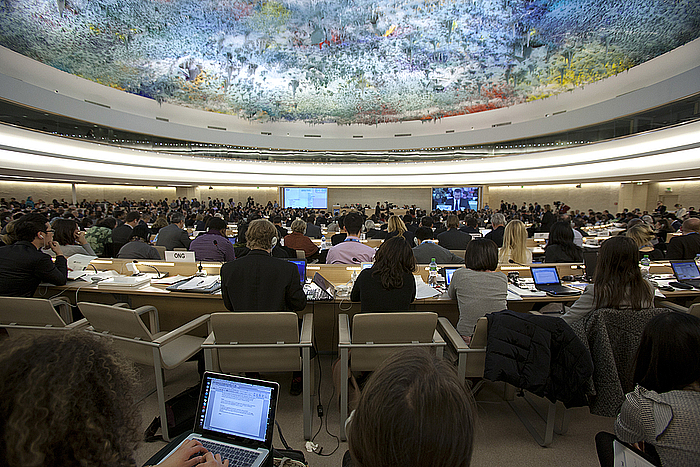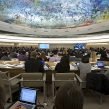
Kazakhstan Elected Member of UN Human Rights Council
Publication: Eurasia Daily Monitor Volume: 9 Issue: 211
By:

On November 12, the 67th session of the United Nations General Assembly (UNGA) elected Kazakhstan for the first time to the UN Human Rights Council, for the 2013–2015 term, with 183 of 193 member states voting affirmatively. Various international human rights groups openly lobbied against the election of several countries, including Kazakhstan, but their campaigns proved ineffective. Kazakhstan received the fifth highest vote total of the 20 candidates competing for the 18 available seats for this round.
The Ministry of Foreign Affairs of Kazakhstan stated that, “[The] election of our country to the biggest human rights framework was recognition by the UN of the progress of Kazakhstan in successive promotion and protection of universal human rights and freedoms, as well as clear evidence of a strong commitment to active international cooperation in this area” (Trend, November 12).
The Human Rights Council is the UN’s main inter-governmental body devoted to promoting international human rights. According to UN General Assembly Resolution 60/251, adopted March 15, 2006, in electing states to its seats, UN members should consider candidates’ past contributions and future commitments to promoting global human rights.
The government of Kazakhstan regularly seeks leadership positions in regional and global institutions. Kazakhstan recently chaired the Organization for Security and Cooperation in Europe (OSCE), the Collective Security Treaty Organization (CSTO), the Shanghai Cooperation Organization (SCO) and the Organization of Islamic Cooperation, which upon Kazakhstan’s initiative established a Commission on Human Rights (CaspionNet, November 14).
In their election campaign, Kazakhstani representatives said they have adopted many of the key international human rights conventions. They also cited their recent civil, political, social, economic and cultural human rights reforms including Kazakhstan’s National Human Rights Action Plan for 2009–2012, the Concept of Legal Policy for 2010–2020, and the Gender Equality Strategy for 2006–2016. These reforms limited use of the death penalty, strengthened legal guarantees in criminal procedure, reinforced measures to combat corruption and improve the judicial system, increased support to vulnerable societal groups, enhanced consumer rights, and strengthened the rights of refugees.
Kazakhstani representatives also noted that various human rights institutions operate in Kazakhstan, including the National Commission on Human Rights, Human Rights Ombudsman, the National Commission on Family Affairs and Gender Policy, the Assembly of People of Kazakhstan, and the Committee for Protection of Children’s Rights (Aide-memoire on Kazakhstan’s UN Human Rights Council candidacy, July 3).
The last UN-mandated Universal Periodical Review of Kazakhstan occurred in February 2010, which resulted in 120 recommendations for improving the country’s human rights policies. Kazakhstan states it has since implemented 90 percent of these recommendations (CaspionNet, November 14). Kazakhstan also hosted recent visits by the UN Special Rapporteurs and Experts on Torture, Minority Issues, Housing and Education, as well as the UN High Commissioner for Human Rights (Aide-memoire, July 3).
Kazakhstani officials note that they now have a formal multi-party system, with many parties competing in the 2012 parliamentary elections and more than one party represented in the national legislature. Critics claim that only regime-approved parties and candidates are able to compete effectively. Reporters Without Borders ranked Kazakhstan 154 out of 179 countries in its 2011/2012 Press Freedom Index (https://en.rsf.org/press-freedom-index-2011-2012,1043.html). Moreover, Freedom House ranked Kazakhstan “Not Free,” with a score of 6 for political liberties and 5 on civil liberties (https://www.freedomhouse.org/report-types/freedom-world). Human Rights Watch attacked Kazakhstan for opposing UN resolutions critical of human rights victims in Iran and for backing a Cuban-sponsored resolution on “human rights and cultural diversity” that Human Rights Watch claims weakened international support for human rights (HRW, “Evaluation of Candidates,” November 8).
After Kazakhstan’s election to the Council, Altay Abibullayev, spokesperson for Kazakhstan’s Ministry of Foreign Affairs, said that, “We are pleased to have been elected to the UN Human Rights Council. But we do not see it solely as a badge of honor. We see it as an opportunity to contribute to global efforts to make progress in this crucial field” (Universal Newswires, November 14).
The Human Rights Commissioner of Kazakhstan, Askar Shakirov, attributed his country’s election to the “methodical and active work directed to the development of the national system of human rights’ protection that has been done over the period of the country’s independence” (Kazinform, November 13).
The National Ombudsman of the Republic of Kazakhstan, who works with domestic and foreign human rights organizations, said the election demonstrated the international community’s appreciation of Kazakhstan’s humanitarian efforts and would “allow Kazakhstan to play a more active role in the UN Council on Human Rights, speed up its integration into the international human rights community and facilitate exchange of positive experience in this sphere.” He stressed the membership on the Council “means more responsibility in ensuring effective implementation of human rights” (Kazinform, November 13).
In July 2012, the government of Kazakhstan pledged to support human rights and democratic values if elected to the Human Rights Council (Aide-memoire, July 3), stressing its plan to:
• Enhance credibility and effectiveness of the Human Rights Council;
• Promote observance of civil, political, economic, social and cultural rights with due regard for the rights of the most vulnerable groups;
• Follow the highest standards of interaction during the Universal Periodic Review, based on the principles of fairness, impartiality, non-selectivity and constructive dialogue;
• Actively promote the effectiveness of the Universal Periodic Review;
• Promote effective implementation of the mandates by Special Procedures;
• Expand outreach activities of the UN human rights mechanisms;
• Serve as the catalyst for policy formulation related to democratic reforms at the regional and sub-regional levels in accordance with best practices learned as a member of the Human Rights Council.
These are admirable goals and can serve as criteria for how the Kazakhstani government and its critics assess Kazakhstan’s Council membership in the next three years. And while Kazakhstan has come a long way in addressing its own human rights weaknesses domestically, more work remains for the government.




